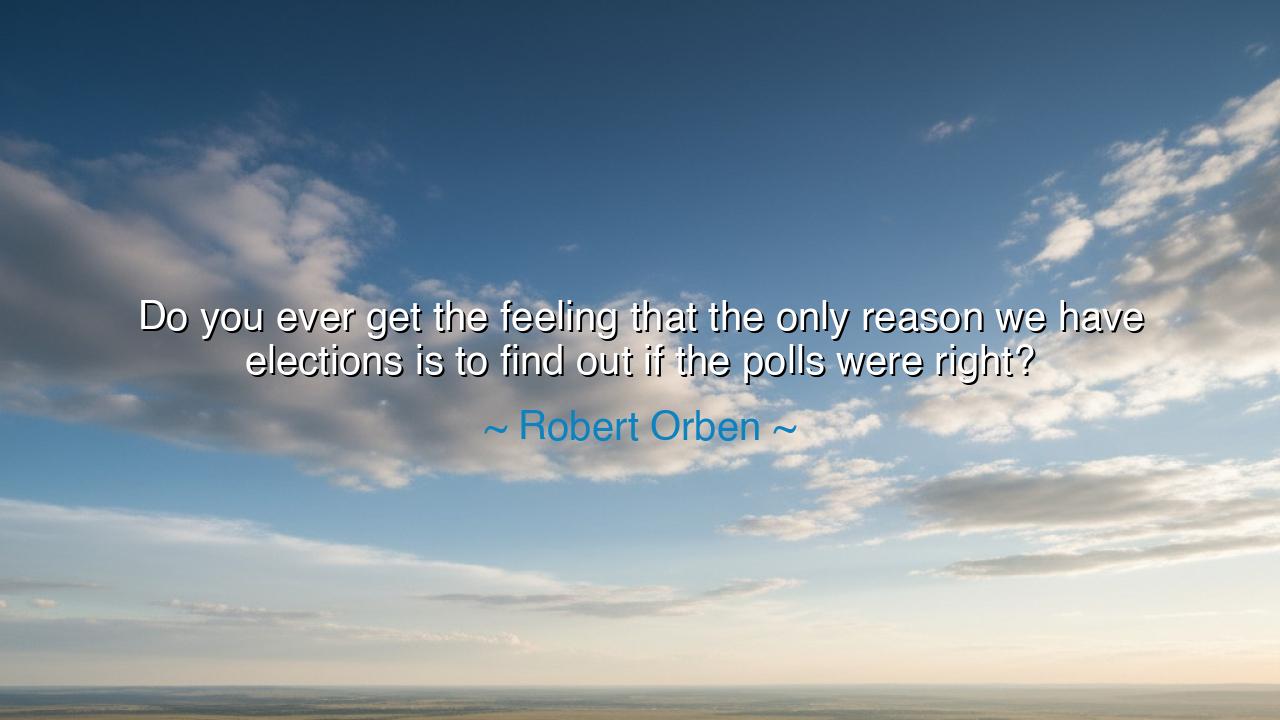
Do you ever get the feeling that the only reason we have
Do you ever get the feeling that the only reason we have elections is to find out if the polls were right?






The words of Robert Orben — “Do you ever get the feeling that the only reason we have elections is to find out if the polls were right?” — echo like a lament from the age of prophets. They remind us that what was once a sacred rite of choice, where the people lifted their voices to shape the destiny of nations, has been reduced in the eyes of many to a mere confirmation of statistics. The election, meant to be a living fire of democracy, becomes a shadow of itself when its worth is measured only against the cold arithmetic of polls.
In these words lies not only wit, but also sorrow. For what are polls but the whispers of prediction, frail and fleeting as reeds bent by the wind? And yet, men have begun to treat them as oracles, venerating their forecasts more than the ballots themselves. This is the burden Orben lays before us: that a ritual meant to ignite hope and bind a people together now risks being seen as no more than a test of the seers of numbers.
Consider the tale of Harry Truman’s triumph in 1948. The newspapers, guided by their polls, declared the victory of his rival before the final count was even known. And yet, when the dawn broke, the people’s voice had spoken otherwise. The polls had failed, the prophets of numbers were shamed, and Truman held aloft the banner of victory. This story, remembered through the photograph of Truman smiling with the infamous headline, teaches us that the people’s will cannot be chained to prediction, and that the election itself carries a might greater than the charts of men.
Orben’s words, then, are not merely satire; they are a warning. If we reduce the sacred to the statistical, if we measure our freedom only by how well the polls align with the outcome, then we risk forgetting the deeper meaning of choice. The vote is not for the validation of forecasters — it is the covenant between the governed and those who would govern. To mistake it for less is to trade the thunder of the people for the whisper of surveyors.
Let those who hear these words remember: the power of the ballot is not in proving the wise men right, but in shaping the world anew. The election is the furnace of the people’s will, and the polls are but sparks that may or may not reflect its flame. Guard this truth, children of tomorrow, lest the spirit of liberty be reduced to a ledger of predictions, and the thunder of your voice be silenced by the murmurs of probability.






TTTrinh Thi Thao
Robert Orben’s remark is a sharp critique of the way modern elections are often viewed—more as an exercise in confirming predictions than as an actual democratic process. But is this really true? Do we allow polling to overshadow the importance of our collective voice in elections? If so, how can we shift the focus back to genuine political engagement, where voters' choices are valued over the accuracy of predictions?
UGUser Google
This quote definitely captures a sense of apathy about the electoral process. If elections are just a way to see if polls were right, do they lose their meaning as a democratic act? What’s the point of voting if the outcome feels predetermined by data? Should we place less emphasis on polls and more on engaging voters in meaningful conversations about policy and leadership?
MTNguyen Dinh Minh Triet
Orben’s quote taps into a skepticism about the role of polls in politics. Are we now more focused on the accuracy of predictions than on the significance of the election itself? This makes me question whether elections have truly become a reflection of the people’s voice, or whether they are shaped by media and polling organizations. How much of our voting behavior is influenced by what we think the polls will say?
GBGia Bao
I can relate to the frustration in this quote—sometimes it feels like elections are less about democratic choice and more about seeing if the predictions were accurate. Is polling now so influential that it almost dictates the political narrative, making elections more of a formality? Should we rethink how polls are used and whether they really reflect the will of the people, or just the noise in the system?
NTnguyen trang
This quote seems to be a cynical take on elections and polling. Do we truly have a voice in choosing leaders, or are elections just a way to confirm the polls’ predictions? It makes me wonder whether public opinion and political campaigns are driven by poll data, rather than real engagement with the voters. Is the true essence of democracy being lost in the numbers game, where the outcome is already anticipated?